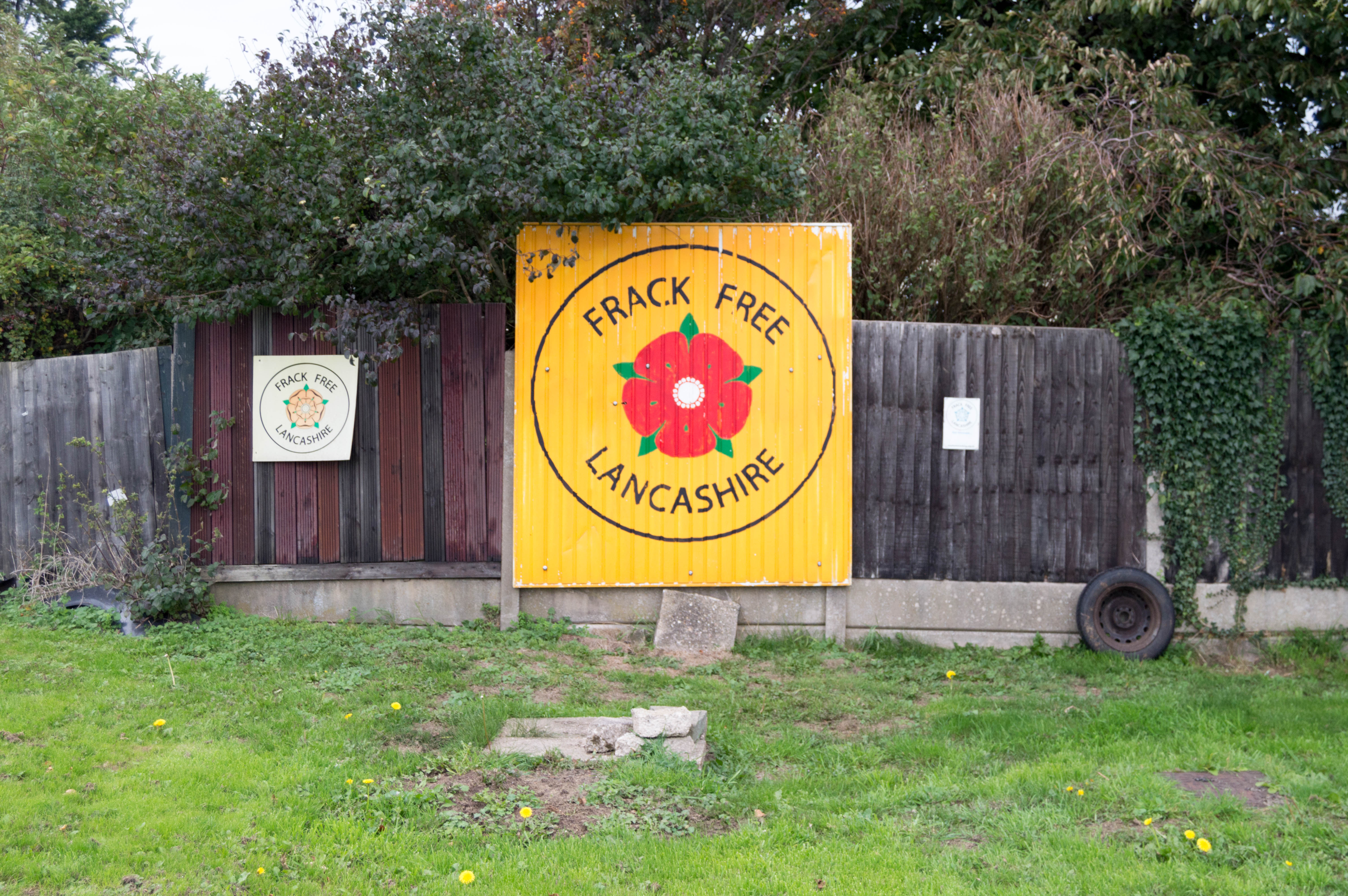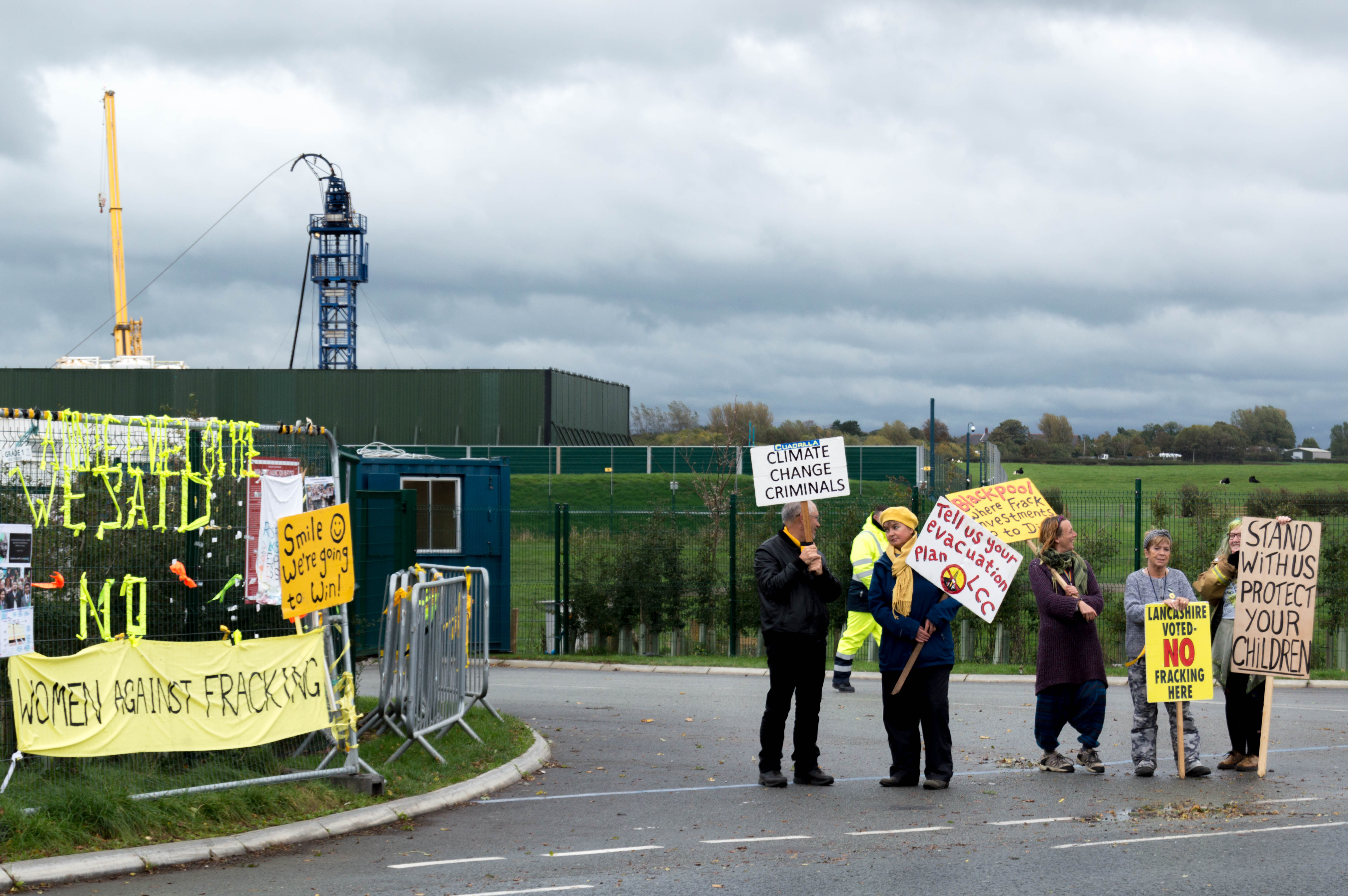
(Photo: Sophie Yeo)
The A583 is a road much like any other road in the north of England. Linking Preston with the shabby seaside resort town of Blackpool, it divides miles of featureless fields, punctuated every once in a while by a stately home, garden center, or coffee shop.
But as you pass the parish of Little Plumpton in the county of Lancashire, things start to get more interesting. For almost two years now, there has been a constant cluster of people on Preston New Road, as the A583 is known.
There are various ways to pass the time among this group. You can drink tea from the cast-iron teapot that sits on their makeshift stove, watch the cows in the opposite field, or join in the occasional shouting match with the tweed-clad men shooting ducks in the adjacent field. On this particular October day, a woman called Heather is drawing on pages of her “visual journal,” a small notebook filled with poetry and patterns and drawings of Manchester bridges.
But today, like most days, they are mainly occupied with watching the motionless rig in the opposite field, and doing whatever it takes to ensure that it stays motionless. Many have visited this place daily since January of 2017, when the energy company Cuadrilla started constructing this rig, intending to frack for shale gas.
While fracking has changed the face of energy production in the United States, the technology is a long way from being socially accepted in the United Kingdom, let alone from becoming a serious component of the energy mix. The Conservative government has rallied behind fracking, but local Lancastrians are less united in their enthusiasm. Indeed, the issue has been bitterly divisive.
“They don’t have my permission to come here and do this. We bloody live here, and it’s not fair,” says John Hobson, a semi-retired consultant who has been protesting Cuadrilla’s presence since the beginning. “It’s changed my life. I didn’t used to spend my life by the roadside in the rain. My wife thinks I’m quite fixated on it, I suspect. And I am. It’s become very important to me.”
Origins of the U.K. Fracking Dispute
The last time the U.K. attempted fracking was seven years ago, at another site near Blackpool. It didn’t end well. After an earthquake registering at 2.3 on the Richter scale was linked to the fracking, the government imposed a temporary moratorium on the practice. America’s own experiences with fracking have done little to inspire confidence on the other side of the Atlantic.
Locals like Hobson fear the effects that fracking could have on their own environment, including water contamination, earthquakes, air pollution, and a decrease in property values. There are also concerns over climate change, and whether the U.K. should be developing a new source of fossil fuels at all, given the urgency of reducing carbon emissions.
Cuadrilla has responded to complaints with vehement denials and excuses. Meanwhile, these concerns will be tough to verify until the damage is actually done. In approving the application to frack at Preston New Road, the government declared that extracting shale gas could “help meet [the U.K.’s] climate change target” (a separate government report highlights that shale gas has a lower carbon footprint than coal), though this statement sits uncomfortably with advice from the government’s independent advisory body, the Committee on Climate Change, which has said that fracking will only reduce emissions if, among other conditions, gas consumption doesn’t increase overall.

(Photo: Sophie Yeo)
But perhaps the most universal concern among the Preston New Road protesters is that the campaign to open up England for fracking has run roughshod over the democratic process—and that concern is much more difficult to deny.
“Up here, this has been pushed through in an un-democratic system, against the will of the people. It should be communities’ decisions,” Heather says, pausing briefly to point out a mouse that has just scampered behind my rucksack. “These are their homes, and the places they’re leaving to future generations, and we should preserve this. We should be looking after our planet.”
Nevertheless, Cuadrilla finally got its way, and fracking began at Preston New Road in mid-October. Progress hasn’t been smooth—almost immediately, a series of minor earthquakes caused work to cease temporarily—but regardless of this setback, shale gas began flowing to the surface on November 2nd. After briefly de-mobilizing for Christmas, Cuadrilla Chief Executive Francis Egan said that the company was looking forward “to completing the next phase of hydraulic fracturing” in 2019.
The group holding vigil at the rig has fluctuated in size depending on the weather, court dates, and Cuadrilla’s schedule. There are some regulars, but it would be a stretch to say that this hardcore group speaks for the people of Lancashire as a whole. Indeed, there are those who welcome the opportunities brought in by this nascent industry. A local businessman chairs the Lancashire for Shale lobby group, and one taxi driver spent the journey to the traffic site explaining to me the virtues of fracking and his irritation at the constant presence of the protesters.
Selective Respect for Self-Determination
The U.K. government itself has demonstrated a somewhat wavering commitment toward self-determination. Since 52 percent of the country voted in favor of Brexit, Conservatives have chained themselves to the idea of “the will of the people” the way one might cling to a life raft in a stormy sea, as negotiations with Europe become ever more fractious. Indeed, the party is professedly devoted to the idea of “localism,” and to devolving more power to local governments. These principles have been less apparent in Lancashire, where the government has taken a heavy-handed approach to realizing its vision, regardless of the will of Lancastrians.
That aggressive approach came to the fore a couple of years ago. In June of 2015, Lancashire County Council rejected Cuadrilla’s application to frack for shale gas at Preston New Road, to the delight of protesters. But their happiness was short-lived. The following year, then-Communities Secretary Sajid Javid overturned the decision, prompting accusations that the government was ignoring the pillars of local democracy to force unwanted fossil fuel development onto communities. Certain ill-judged comments have added to the impression that the central government has all but dismissed the concerns of local people—including Energy Minister Claire Perry, who branded anti-fracking protesters a “traveling circus,” and Lord Howell, the former secretary of state for energy, who called for fracking in the “desolate” northeast.

(Photo: Sophie Yeo)
In the summer of 2018, the government released proposals to fast-track fracking through the planning process. Under their plans—which have prompted backlash from within the Tory party ranks—drilling an exploratory well would be no more complicated than building a conservatory or shed. The government has also consulted about whether decisions on full-on fracking proposals should be left to Westminster politicians, or to the affected local communities.
“When I first came here, in 2015, everyone was saying, ‘It’s no longer about fracking. It’s about democracy now.’ I think that comes from this feeling of disempowerment that there’s nothing they can do to influence what is going to happen in their community,” says Anna Szolucha of Northumbria University, who has researched the ties between fracking and local democracy. “Back then, fracking was just a possibility, but already at that point, people had started writing letters to their MPs, to different regulators, to different agencies, and they were essentially faced with this brick wall.”
That sense of powerlessness now characterizes locals’ attitude toward the judiciary too. In 2018, three fracking protesters were sent to prison for 15 and 16 months respectively after a peaceful protest, where they spent almost 100 hours atop semi-trucks making deliveries to the Cuadrilla site. In response, over 1,500 academics signed an open letter opposing the “absurdly harsh sentence,” and highlighting that it was the first time since 1932 that environmental activists had been imprisoned for a protest in the U.K. “We need more, not less, space for action to confront unsustainable industrial practices that harm our communities and perpetuate our reliance on fossil fuels,” the letter said.
The three men were eventually released, after the Court of Appeal deemed their sentences “manifestly excessive,” and questions emerged over the judge’s family links to the oil and gas industry. In another courtroom fracking drama, the courts quashed a temporary injunction against Cuadrilla, which had been installed after an activist accused Lancashire County Council of failing to draw up an emergency evacuation plan. These incidents did little to diminish fears that the odds are stacked against local people who dare to take a stand against fracking.
“For me, it’s not like fracking is the No. 1 issue. It’s people having a voice, people’s liberation and freedoms. It’s about getting away from capitalist consumerism in society, and people coming together as communities and looking after their planet, looking after each other,” Heather says.
Meanwhile, outside of America, fracking has become increasingly friendless. It is banned in European countries, including France, Ireland, and the Netherlands. The governments of Scotland and Wales oppose it, and the U.K. Labour Party has also said that it will ban the practice should it win power. More widely, the anti-fracking movement has become one expression of a growing dissatisfaction with the state of democracy as a whole.
“This new industry is not happening in the same reality as when the coal industry or even the conventional oil and gas industry came about. It’s happening in an entirely different context and reality—and part of that reality is the fact that people are protesting against how the current model of democracy works,” Szolucha says.
“When you think about movements like Occupy, Standing Rock, Indignados, or all the different movements against extractivism in Latin America, it all seems to be part of a bigger wave of social movements, where people are starting to question how the current representative model of democracy works, and if it really represents them,” Szolucha continues. “Even though they’ve got formal rights to vote, and freedom of speech, does that really give them power to have a real impact on what’s going on in their countries and in their community?”
As storm clouds gathered over the Lancastrian countryside last October, as anxious protesters waited for the courts to deliver the go-ahead for Cuadrilla to frack, I asked if they were scared of failing, of watching the machinery crank into action at last, after two years of putting their lives, bodies, and freedom on the line. But it was the wrong question: If there was fear at all here, it was not of this single drill, in a single field.
New Landscapes is a regular series investigating how environmental policies are affecting communities across America.





